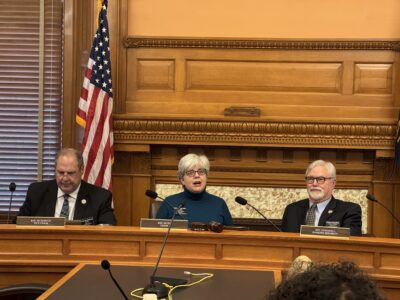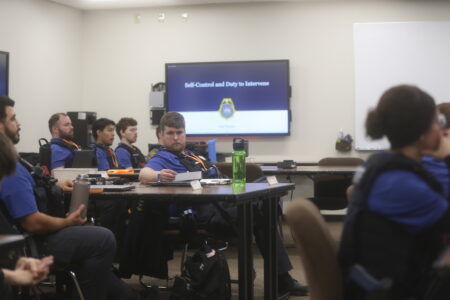KU Athletics has cut workforce by 8% to 10%, expects to save $3 million

photo by: AP Photo/Charlie Riedel
Kansas and Oklahoma State play during the second half of an NCAA college basketball game at Allen Fieldhouse, Saturday, Feb. 22, 2025, in Lawrence. Kansas won 96-64.
The University of Kansas athletic department has in less than a year reduced its workforce by about 30 people, athletic director Travis Goff told the Journal-World on Tuesday afternoon.
By beginning with a hiring freeze at the start of last fall, continuing by offering its employees voluntary separations in January and most recently undergoing an “involuntary targeted reduction,” or layoffs, KU Athletics has cut down its number of employees by 8% to 10%, he said.
Goff emphasized in an interview that this comes at an unprecedented time during which college athletic programs are dealing with “a combination of, frankly, a financial model that across the country is not very viable, one, with the intersection of NIL and then the House settlement, two.”
“I’m really proud of how we’ve managed this dynamic this year,” he continued. “My belief is many places across the country are doing similar type (of) work, and I’ll be honest with you, those that aren’t ought to be, because this is not unique to KU in this environment by any stretch of the imagination. I’m proud that we’re taking responsibility and actively and strategically managing it.”
Goff said that the reduction of 30 employees will save the department approximately $3 million.
During the fiscal year 2025, which ends in June, KU Athletics has been operating at a $16 million deficit, projecting revenues of $122 million to fall short of expenses of $138 million, citing lost revenues from playing its football games off campus during the 2024 season.
Goff said the department has long been aware it would be at an “interesting crossroads” from a financial standpoint given the off-campus football games and the impending need to budget in as much as $20 million to share revenue with its athletes, as part of the pending House v. NCAA antitrust settlement.
“We’ve spent all year from a variety of angles, expenses, revenues, partnerships, doing everything we possibly can to make sure we can project out a balanced budget in the subsequent years,” he said. “It gets harder because of those variables and it doesn’t take much to look across the country to see the challenges of intercollegiate athletics financially, just about any place you name it.”
He said he is increasingly confident that KU will be “a very financially viable program going forward.” With regard to the House settlement, about which KU Chancellor Douglas Girod has previously said that the university doesn’t have “$20 million a year laying around in any pockets waiting to be deployed,” Goff said that KU will be sharing revenue at “a maximum competitive level.”
“I probably won’t give you (the number) to the penny, but yes, the answer is that’s just what it’s going to take,” he said, “and we’re not interested in launching in this new realm at any kind of disadvantage.”
As KU sought to balance its budget, it began the process of evaluating its personnel last summer heading into the fall.
“We knew enough to know we really needed to scrutinize every line item of how we were allocating our resources,” he said. “As we started that scrutiny and then as we brought on Deloitte, it was very clear that personnel — I mean it’s obvious, right — personnel’s a huge element of how we expend resources, and so what we decided going into the fall was let’s do, in essence, a hiring freeze.”
As the Journal-World previously reported, KU signed a deal with Deloitte in August to pay the consulting firm $200,000 to provide recommendations on revenue-sharing and NIL issues, partnerships with third-party vendors, revenue generation and valuation of the athletic department. Per the terms of the contract, Deloitte would render a report by February.
Reflecting on the partnership, Goff said it was valuable to inspect the athletic department’s operations using a lens from the corporate world, and also, “We wanted to have a really disciplined perspective when you talked about how you’re allocating your resources — do they fit and align with the priorities that you’re stating are at the forefront.”
“They looked at organizational structure,” he added. “They didn’t tell us maybe anything shocking or profound, but I think it was good to just have another set of eyes on that. All those things and then some. And then obviously they were important in partnering with us to just be as organized as we could be entering into the House settlement environment.”
(Goff also clarified that even though Deloitte is operating the clearinghouse that will approve NIL sponsorship deals based on fair-market value under the pending settlement, the firm did not provide KU any insight into that process, as KU hired Deloitte long before it received the clearinghouse responsibility.)
In the fall, while undergoing the hiring freeze, KU Athletics then “started the opportunity to really evaluate our structure, our organizational design, and our personnel,” Goff said. That was what led KU to realize it needed to allocate its personnel differently.
At the start of the new year, it began offering voluntary separations to employees who wanted to leave. Then were the layoffs, enacted through what Goff called “as disciplined and unbiased” a process as possible, at least one of which has become public in recent days as a former social media manager announced her departure due to “budget cuts and restructuring.”
“Obviously those are really hard,” he said. “You never want to have to do that. But ultimately it’s my responsibility to lead the department and make some decisions that are difficult, are challenging. And this is certainly one of those.
“We had many a month, a multi-month process to evaluate roles and units. We certainly had to take into account what hiring freeze and voluntary separation created in terms of headcount in certain areas, and then we’ve kind of worked through that part.”







